Older News
Explore the Centre’s news stories from 2010 and before.
Older News
The clock is ticking
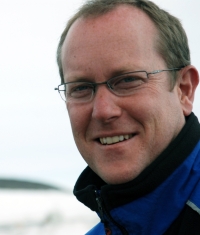
16 December 2010
Victoria University Antarctic and climate change researcher Professor Tim Naish has been watching the weather this year and finding nothing to reassure him.
The world’s climate has been highly variable and erratic—a harbinger of global warming. Making the headlines have been a super cold Russian winter and the ongoing drought and water shortage in South Australia. Other changes continue under the radar, including the loss of glaciers in the Andes and the Himalayas and growing acidification of the world’s oceans.
In Antarctica, where Tim’s research is focused, the trends are the same. Both the Greenland and West Antarctic ice sheets are beginning to melt and new research suggests the same is happening to the world’s biggest ice sheet in East Antarctica.
“Rising sea levels present one of the biggest threats to civilisation as we know it,” says Tim.
Tim is Director of Victoria University’s Antarctic Research Centre and one of the lead authors of the next international climate change assessment from the Intergovernmental Panel on Climate Change (IPCC), due for release in 2014. Much of his recent research has been carried out as part of the international ANDRILL drilling programme which is providing the first comprehensive picture of how Antarctic ice shelves and ice sheets behaved during past periods of natural global warming.
A team of Victoria-led New Zealand scientists has drilled two holes, each over 1000 metres deep, into the floor of McMurdo Sound to recover sediment cores that preserve a history of climate and ice sheet behaviour during the past 20 million years.
Tim says around four million years ago, the Earth was experiencing a hotter climate, with temperatures similar to what global warming is likely to deliver in the next century. Back then, he says, the West Antarctic ice sheet had melted, contributing five metres of sea level rise, while melting of the Greenland ice sheet contributed another seven metres.
His observations, from the drill cores and colleagues’ computer simulations of the Antarctic ice sheets, support the findings of many other researchers around the world—that a one metre rise is the most likely scenario by the end of this century, though up to 1.5 metres is possible. Tim’s assessment is relatively conservative, with other scientists predicting rises of up to two metres.
“The consequences of even a one metre rise are huge,” he says. “Around 150 million people, many of whom are the world’s poorest, will be affected.”
Melting of the great ice sheets of Greenland and the Antarctic has only become evident in the last decade.
“Since then, satellite data is showing clear evidence of accelerating losses from both ice sheets and a doubling, in the last five years, of ice melting into the oceans.”
Tim says ice sheets like West Antarctic are more likely to collapse than melt at a predictable rate.
“Around two-thirds of the ice sheet is below sea level so when the ocean warms the ice is very susceptible to melting. The warm water gets into the soft underbelly and it melts from the bottom up. It also lubricates the bases of the ice sheets and glaciers, a process that tends to increase their speed towards the ocean.”
Tim is in no doubt that the impact of climate change will be felt sooner rather than later.
“We are a little bit sheltered in New Zealand but even here there is beginning to be competition for water and many of our towns and cities are near the coastline.
“I’m 43 and I expect to see the negative consequences of climate change in my lifetime but I worry more about my children—they will definitely be impacted.”
Fast treatment for glacier modelling
8 November 2010
Research that will improve understanding of how climate change will impact on New Zealand’s glaciers and enable more accurate planning for water resource and tourism management in the South Island is being turbocharged.
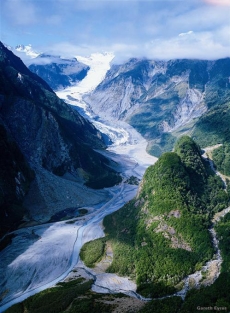
A project based at the Antarctic Research Centre at Victoria and led by post-doctoral fellow Nick Golledge has won one million hours of super fast computing time, the major prize in the University of Canterbury BlueFern High Performance Computing Grand Challenge. The competition was established to help researchers tackle some of the largest scientific problems.
Dr Golledge is using glacier-climate modelling to understand how glaciers in the Southern Alps developed, how they have evolved, and what is likely to happen to them over the next century.
"Understanding how much mass a big glacier like the Tasman will lose over the next 100 years has significant implications for water resource management. Glaciers like Franz Josef also attract tourists and are fundamental to the local economy so if they retreat over the next century there could be major socio-economic impacts."
Dr Golledge, who connects remotely to the BlueFern from his office at Victoria, says winning the Grand Challenge will give him priority access to supercomputing capability, allowing him to undertake more ambitious modelling and complete it faster.
"We will be able to generate much higher resolution simulations and consider longer scenarios and that means we can produce higher impact science."
Dr Golledge will be using a 3D ice sheet model originally developed at the University of Fairbanks, Alaska, to analyse glacier growth and decay over the past 100,000 years. He will then apply the resulting data to simulate scenarios for the future.
Originally from Scotland, Dr Golledge has worked as a glacial geologist at the British Geological Survey. His PhD study investigated Younger Dryas-age glaciers in Scotland, formed between 11 and 12 thousand years ago, and the climate that gave rise to them.
Antarctic scientific drilling project gets underway
3 November 2010
Scientists and engineers headed south last week to prepare for the most challenging sub-ice drilling project yet attempted in Antarctica.
The multinational project, being led by New Zealand and the United States, will operate at a remote camp more than 100km from Scott Base on the Ross Ice Shelf.
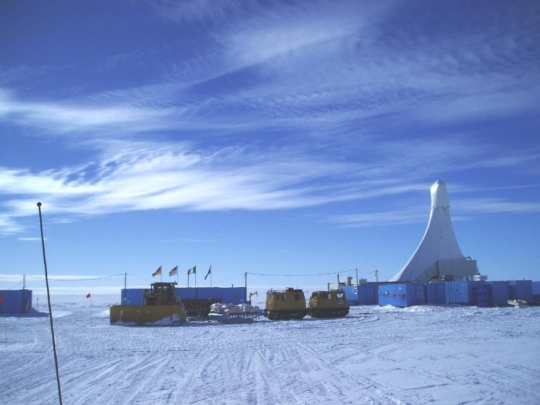
The leading New Zealand organisations include Victoria University, GNS Science, and Antarctica New Zealand, with scientists from NIWA and the University of Otago also involved.
The programme for this summer will consist of a range of activities to prepare for another leg of the ANDRILL drilling project planned for the 2013-14 summer season at Coulman High, 150km northeast of Scott Base.
ANDRILL's previous drilling projects, on the McMurdo Ice Shelf in 2006 and 2007, recovered the two deepest rock cores in Antarctica—1285m and 1138m beneath the sea floor—containing a climate history of the continent going back 20 million years.
The project at Coulman High is targeting rock and sediment from an older era when atmospheric greenhouse gases were up to three times higher than pre-industrial levels, or similar to what some climate models project for the end of this century.
When the deep drilling gets underway in 2013/14, the drill will need to pass through 250m of ice, 650m of seawater and then about 1000m into the seabed. The ice shelf is moving at about 2m-a-day, which will put stress on the drilling equipment and drill pipe.
The rate of ice flow is about 10 times faster than at the two previous ANDRILL drilling sites. It will give drillers about a 20-day window before the drill pipes bend to the point where drilling could become impractical.
Lead New Zealand scientist, Dr Richard Levy from GNS Science, says that scientists hope to collect drill core that shows the transition from an ice-free continent, to a time when large Antarctic ice sheets had developed, about 34 million years ago.
"It's a continuation of previous ANDRILL projects and takes us further back in time to periods when global temperatures were about 6 degrees Celsius warmer than today," Dr Levy said.
To improve the knowledge of ice sheet behaviour and the likely impact on sea level, scientists need to collect more geological information from drilling, which would be used to further develop computer-generated climate, ice, and ocean models.
Logistics Manager Tamsin Falconer, of Victoria's Antarctic Research Centre, explained that this summer's work is critical for preparing for future drilling.
"Before we embark on the drilling, we need to collect a wide range of environmental information about the site to ensure the drillers and engineers are appropriately prepared."
One of the first big jobs will be to move 20 shipping containers of equipment from Scott Base to the Coulman High site. The equipment includes the hot-water drill, living quarters for about a dozen people, and kitchen facilities.
Following climate scientists to the far south - the diary of a documentary film-maker (talk by Dr Simon Lamb).
17 September 2010
In conjunction with New Zealand Antarctic Society (Inc) and Antarctic Research Centre.
I went to Antarctica during the 2007 IPY field season, as part of a project to make a feature documentary on the science and scientists behind climate change. Over a period of 4 weeks I visited 8 scientific projects in the Ross Sea region of Antarctica, filming scientists at work. A few months later, in early 2008, I accompanied sea scientists on a research cruise to the southern ocean.
The talk focussed on the realities and problems of filming scientific research in sub-zero conditions and on the high seas.
Two ARC students win awards
July 2010
Two ARC students won awards at the 2010 Antarctic Conference held 5-7th July in Christchurch.
Rory Mearns was awarded 2nd place for Best Student Poster for his presentation on Marine Palynomorphs from the AND-1B Drill-Core McMurdo Sound, Antarctica. Rachel Rhodes' presentation on Trace Element Concentrations reveal Little Ice Age in an Antarctic Ice Core, was awarded 2nd place for Best Student Talk.
Other staff and students presenting papers at the conference included Lionel Carter, Nancy Bertler, Lana Cohen, Bradley Markle, Huw Horgan, Holly Winton, and Melissa Bowen.
2010 S.T. Lee Lecture in Antarctic Studies Dr Robert Bindschadler, Emeritus Scientist, Hydrospheric and Biospheric Sciences Laboratory, NASA, USA presented the 2010 S.T. Lee Lecture on the 19 May at Victoria University. His talk entitled "Waking Giants: Ice Sheets in a Warming World" looked at the fate of the Greenland and Antarctic ice sheets in a warming climate.
Three ARC members in 2010 New Year Honours List
January 2010
Three ARC members were awarded the New Zealand Antarctic Medal in the 2010 New Year Honours List. Peter Barrett, for services to Antarctic science, Alex Pyne, for services to Antarctic engineering, and Tim Naish, for services to Antarctic climate science. The New Zealand Antarctic Medal was formally instituted in 2006 as a replacement to the (British) Polar Medal and given to individuals or a team who have made an outstanding contribution to exploration, scientific research, conservation, environmental protection, or knowledge of the Antarctic region.
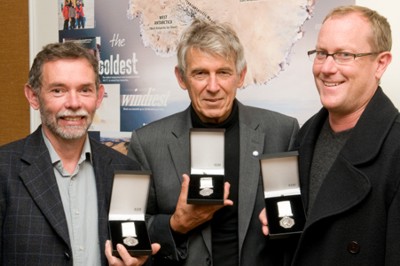
ARC Administration team wins award
Tamsin Falconer, Centre Manager and Michelle Dow, Administrator, were awarded a 2010 Victoria University General Staff Excellence Award for their outstanding service and contribution to the Antarctic Research Centre.
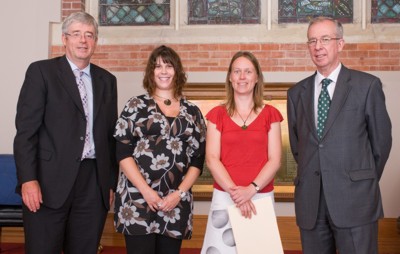
Postgraduate Research Excellence Award
PhD student Rachael Rhodes received a Victoria University Postgraduate Research Excellence Award valued at $3000 for her recent publication in Geophysical Research Letters. Rachael also received the prize for best science talk at the recent Post-Graduate Student Association Conference.
Rosie Cody wins GSNZ prize
Rosie Cody received the Hornibrook Prize from the Geological Society of New Zealand for outstanding research contribution by a graduate student in the fields of paleontology and biostratigraphy.
Talk by ice core researcher, Dorthe Dahl-Jensen
8 October 2010
This year's Ice Core Symposium was held on 8 October at GNS Science's National Isotope Centre. The symposium was well attended by scientists and policymakers from across New Zealand, and several ARC staff and students presented during the one-day event.
The keynote speaker was Prof. Dorthe Dahl-Jensen, Chief Scientist of the multinational Greenland Ice Coring Project (NEEM project) and Director of the Centre for Ice and Climate, University of Copenhagen.
Dorthe also gave a number of stimulating and well attended public talks during her stay, including a presentation at the National Museum Te Papa.
Dorthe and her team are an important collaborator of the NZ-led Roosevelt Island Ice Core Project. This project is supported by the International Partnerships in Ice Core Sciences and seeks to improve our understanding of the stability of the Ross Ice Shelf, Antarctica in a warming world. To view Dorthe's talk click here.
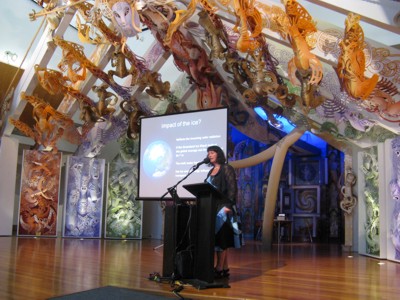
RSNZ medal to ARC Director
Prof Tim Naish has been awarded a 2009 New Zealand Science and Technology Medal by the Royal Society of New Zealand. The award is in recognition of Tim’s scientific leadership and contribution to the knowledge on Antarctic ice sheets and their influence on global sea-level change and climate in a warming world.
Rosie Cody wins Student Poster award
ARC student Rosie Cody has won the Student Poster award at the Paleoclimatology Summer School in Urbino, Italy in July 2009. This is the second year an ARC student has one this prize.
Poles Apart: Gareth Morgan & John McCrystal book
Gareth Morgan couldn't decide whether he believed in climate change or not, so he consulted with the best international scientists, including ARC's Peter Barrett, Lionel Carter, and ARC Adjunct David Lowe, to answer his questions and in conjunction with John McCrystal wrote a book about his findings. For the media release click here
2009 S.T. Lee Lecture
Prof George Denton presented the 2009 S.T. Lee Lecture on the 15 May at the Soundings Theatre, Te Papa. George's pesentation highlighted the origin of the warming events which lie at the heart of solving the ice age puzzle.
Innocents in the Dry Valleys
Ex-VUW lecturer Colin Bull, has written an account of the first Victoria University Antarctic Expedition in 1958-59, in Innocents in the Dry Valleys.
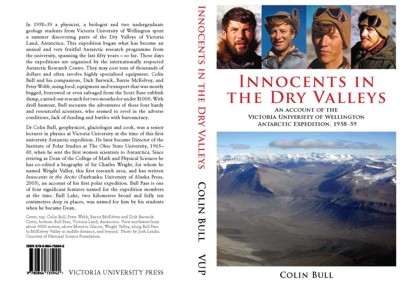
Nature papers on ANDRILL
Nature, Vol 458, Issue 7236 (19 March 2009) published two papers and a News and Views article that reports on the ANDRILL Programs new insights into the behaviour of the West Antarctic Ice Sheet. The publication has generated widespread international news interests with more than 300 media items.
ANDRILL-MIS Science Integration Workshop 2009
More than 60 international scientists attended the ANDRILL McMurdo Ice Shelf Science Integration Workshop here at Victoria University from the 10-13th February 2009. The Workshop involved talks and discussions on the latest results and developed collaborative multidisciplinary teams to address key questions arising from analysis of the core. Two one-day field trips to examine local Pliocene to Recent sedimentary sequences were offered immediately following the workshop on Saturday 14th. The programme and abstracts volume gives an outline of the Workshop including talk and poster abstracts as well as the social events.
ANZICE-GCT Briefing 2009
The FRST programmes, Antarctic New Zealand Interglacial Climate Extremes (ANZICE) and, Global Change through Time (GCT), held a briefing workshop entitled 'Learning from Past Climate Change' on 30 January, 2009, at Victoria University. The event attracted ~ 100 professional and student participants with the purpose of: [1] informing the science and government communities of progress made in identifying New Zealand's environmental responses to past warm extremes, and [2] seeking advice from an expert panel on ways of using scientific information to guide and inform climate change policy.
Rachael Rhodes wins Student Oral Presentation
PhD student Rachael Rhodes won first place in the Student Oral Presentation at the 2008 GeoSciences Conference held at Te Papa from the 24-26th November, 2008. Her talk was entitled 'An ice core indicator of Ross Ice Shelf stability?'
Alex Pyne awarded medal
Alex Pyne has been awarded one of four 2008 Royal Society's New Zealand Science and Technology Medal for his leadership in the field of polar drilling technology, enabling recovery of continuous records of past environments in the most challenging places - Antarctica.
Annette Bolton wins Student Poster award
PhD student Annette Bolton wins the Student Poster award at the Paleoclimatology summer school in Urbino, Italy, July 2008.
2008 S.T. Lee Lecture
Prof. Richard Alley gave the 2008 S.T. Lee Lecture on the 20 May via live-video link. Richard's pesentation highlighted new discoveries that show that elements of Antarctic ice cover are surprisingly sensitive to warming.
ANDRILL Celebratory Function
Antarctica New Zealand and Victoria University of Wellington hosted a function at Rutherford House on the 27 May 2008 to celebrate the scientific and technical achievements of both the ANDRILL McMurdo Ice Shelf (MIS) and Southern McMurdo Sound (SMS) drilling projects. Guest speakers included Hon Pete Hodgson, Minister of Research, Science and Technology; Murray Bain, Chief Executive, Foundation for Research, Science and Technology; and Dr Alex Malahoff, Chief Executive, GNS Science. Presentations were also given to Jim Cowie, Project Manager and Alex Pyne, Drilling Science Manager for their outstanding contributions to the ANDRILL project.
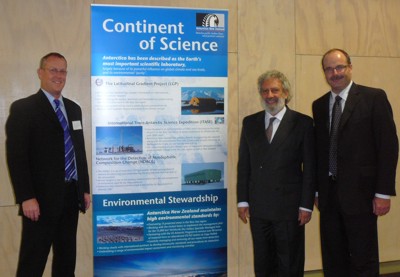
A Celebration of Peter Barrett's Achievements
On the 26th March there was an official opening and unveiling of ARC meeting room ' named the Beacon Room in honour of Prof Peter Barrett, the first Director of the Antarctic Research Centre from 1971-2007 in recognition of his work and discovery of the first tetrapod remains in the Beacon Supergroup, a succession of Devonian to Triassic (420-200 million years old) sedimentary strata that stretches the length of the Transantarctic Mountains. The following week, on the 2nd April, there was a celebration to formally mark the stepping-down of Peter as the ARC Director and to highlight his achievements during this time. The Vice-Chancellor, Prof Pat Walsh, opened the ceremony, and speeches were given by Prof Tim Naish, who has taken over the role of ARC Director and Alex Pyne, who told some interesting stories on Peter's earlier adventures in Antarctica.
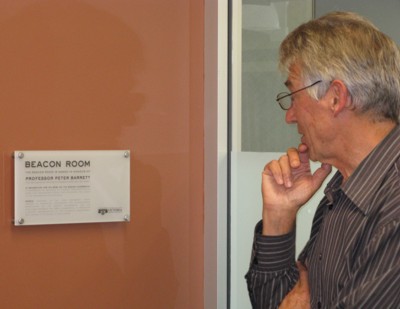
A new Director for the Antarctic Research Centre
In January 2008, Prof Tim Naish was appointed as the new Director for the ARC, taking over from Prof Peter Barrett. Peter continues to work within the ARC as well as a new position for the Climate Change Research Institute of Victoria University.
Antarctic Conference 2007
Antarctica New Zealand and the Royal Society of New Zealand are holding a conference in Wellington, celebrating 50 years of New Zealand's involvement in the Antarctic. The conference aims to present the successes of the past (International Geophysical Year to present day) and enthuse New Zealand about its future in Antarctica. Click here for more detailed information.
50 Years of New Zealand in Antarctica 1957-2007 Commemorative Weekend
The New Zealand Antarctic Society, in association with Christchurch International Airport Limited as principal sponsor, Antarctica New Zealand, the Christchurch City Council, the International Antarctic Centre and the Air Force Museum, will celebrate 50 years of New Zealand's involvement in Antarctica. For further information please click here.
VUWAE Reunion 2007
More than 70 past Victoria University of Wellington Antarctic Expedition (VUWAE) members and invited guests attended the 50 year reunion celebration held at VUW on the 30th June-1 July, 2007. They included alumni from VUWAE 1 in 1957 through to VUWAE 51 in the summer of 2006/2007, along with people from every decade in between.
The reunion programme entitled "The First 50 Years of Victoria University of Wellington Antarctic Expeditions" lists all the VUWAE members from 1957 to 2007 and contains recollections and photos from various VUWAE members. We have some copies of the booklet available, so if you would like one please email your name and address to Antarctic-Research@vuw.ac.nz, and we will send one to you. Alternatively you can view or print a PDF of the booklet herepdf14.2MB.
We have also scanned many slides and obtained a few memorabilia archived and held in the Beaglehole collection at Victoria University. If you have any slides that you would be happy to have scanned, please send them to us with your return address (we would return slides to you). Unfortunately, the cost and handling means we will only be able to handle a limited number of images from each person (up to 20 slides).
The Reunion weekend events are highlighted in the Dec 07 issue of our newsletter, IceSked. Thank you to all that attended and made the weekend so memorable - enjoy!
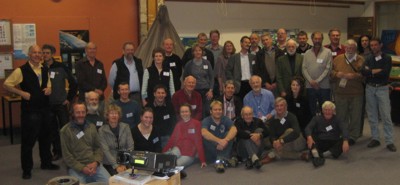
$1 million donation to Antarctic research
A donation of $1million to the University's Antarctic Research Centre by a Victoria alumnus Alan Eggers, a member of the University's 1975 Antarctic Expedition,will strengthen its research into the history and behaviour of the Antarctic ice sheet in the face of global warming. Click here for the VUW media release
2007 S.T. Lee Lecture
Prof. Paul Mayewski gave the 2007 S.T. Lee Lecture on the 26 March. Paul's pesentation outlined the key results from ice core records from Greenland and Antarctica.
2006 Wellingtonian of the Year
In December, Prof. Peter Barrett won the award for Wellingtonian of the Year 2006.
Prof. Peter Barrett wins SCAR medal
At the 2006 Scientific Committee on Antarctic Research (SCAR) meeting on the 12th July, the 2006 SCAR President's Medal for Outstanding Achievement in Antarctic Science was awarded to Professor Peter Barrett.
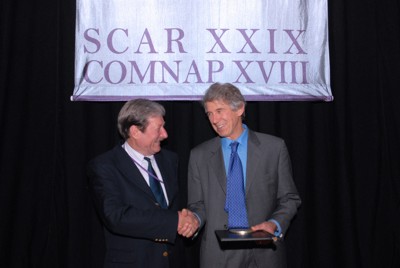
2006 Annual Antarctic Conference
Antarctica New Zealand's Annual Antarctic Conference was hosted by the Antarctic Research Centre at Victoria University from July 4-6, 2006. Click here for more detailed information.
Joint Antarctic Research Institute launch
GNS Science and Victoria University staff and students marked the establishment of the Joint Antarctic Research Institute (JARI) at a function at the University's Adam Art Gallery on Tuesday 14 February 2006 attended by the Minister of Research, Science & Technology, the Hon Steve Maharey.
The JARI, which combines the expertise of Victoria's Antarctic Research Centre and GNS Science's Antarctic research programme, brings together under one umbrella about 30 staff from the two institutions with an interest in Antarctic and related earth science research.
Vice-Chancellor, Professor Pat Walsh, said the JARI would allow both organisations to formalise a long-standing relationship.
"Expanding our already successful Antarctic Research Centre through a formal partnership means the Joint Antarctic Research Institute will bid for external research funding for larger projects, as well as share expertise and analytical facilities held by GNS Science and Victoria. For our students, a closer relationship will open even further opportunities for developing innovative and applied research projects.'
GNS Science Chief Executive Dr Alex Malahoff said the joint initiative marked a new step in collaboration between his organisation and its closest university partner. 'The work of the new Institute will rely very much on our National Isotope Centre, a unique facility in New Zealand for environmental research in Antarctica.' The JARI will be headed by Director, Prof Peter Barrett from Victoria, and Deputy Director, Assoc Prof Tim Naish, who works for both the University and GNS Science. The Joint Antarctic Research Institute will work with other Crown Research Institutes and Universities in carrying out its research.
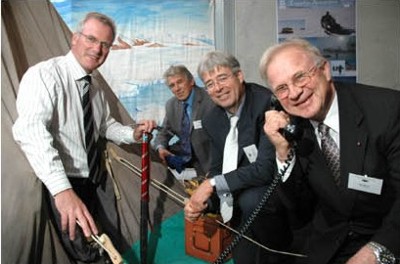
Opening of S. T. Lee Library and the 2005 S.T. Lee Lecture
The Antarctic Research Centre's new S. T. Lee Library was officially opened on 16th June 2005 by the Hon Steve Maharey, Minister of Research, Science and Technology.
The programme for the evening included: A welcome by Prof Pat Walsh, Vice Chancellor of Victoria University, the background by Prof Peter Barrett, Director of the Antarctic Research Centre, and an opening speech by Hon Steve Maharey, Minister of Research, Science and Technology. The Opening was followed by the 2005 S.T. Lee Lecture in Antarctic Studies, by Prof David Sugden of the University of Edinburgh.
David Sugden gives 2005 S. T. Lee Lecture
Prof David Sugden from the University of Ediburgh presented the 2005 S. T. Lee Lecture in Antarctic Studies on 16 June.
Peter Barrett receives 2004 Marsden Medal
Professor Peter Barrett FRSNZ, Director of Victoria University's Antarctic Research Centre, was awarded the 2004 Marsden Medal from the New Zealand Association of Scientists (NZAS) on 17 November 2004. The Marsden Medal is awarded annually to scientists who have contributed a lifetime of outstanding service to science in New Zealand.
NZAS Chair, Professor Euan Smith, says Prof Barrett has been at the forefront of Antarctic Earth Science for the last 40 years. As a graduate student he made a "missing link" discovery (published in Science in 1968) of the first tetrapod fossil to be found in Antarctica, thereby clinching the land connection between Antarctica and the other Gondwana continents.
More details about the Marsden Medal
Prof Peter Barrett acceptance comments for receipt of the Marsden Medal from the NZ Association of Scientists (includes background information).
Royal Society of New Zealand Awards ceremony, Christchurch, 17 November 2004
